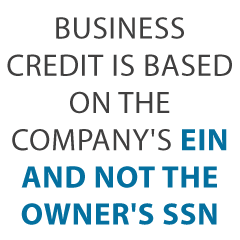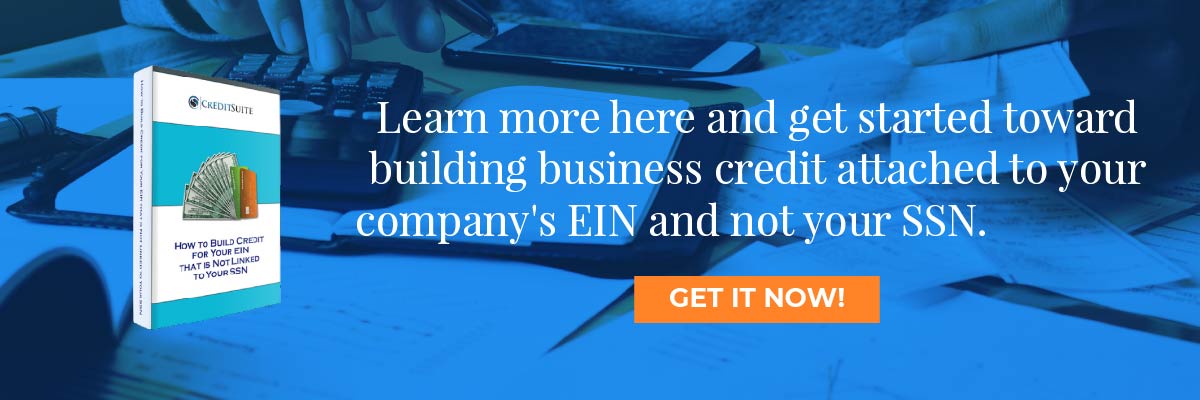- Connect With Us!
- (877) 600-2487
- info@creditsuite.com
Separating Business and Personal Credit
Published By Janet Gershen-Siegel at October 23rd, 2017
Are You Thinking About Separating Business and Personal Credit?
Whether you have a new business, or you are now involved because you obtained one or have suddenly become an owner or a manager here are several reasons you should certainly develop your corporate credit. You should be separating business and personal credit.
Get a D&B D-U-N-S number
You can’t get into Dun & Bradstreet’s system without having one, and they are totally free, anyway. A DUNS number differentiates your company from all others, including similarly-named companies. Dun & Bradstreet has a prerequisite that you register your company on their site prior to they will hand over a DUNS number. Please note: there are a few marginally different ways of acquiring a D-U-N-S if your company is in a specific class. These include if your small business is an USA government contractor or grantee, or your business is in Canada, or you are doing work as an Apple developer.
File a DBA
If you operate your company as a sole proprietor at the very least file for DBA (‘ doing business as’) status. If you do not, then your real name will end up being the same as your company name. Thus, you can still wind up being personally liable for all your small business debts. Plus, according to the IRS, with this structure you have a 1 in 7 chance of an IRS audit. This is in contrast to a 1 in 50 possibility for incorporated businesses! Avoid confusion with this step, and you can substantially reduce your chances of an Internal Revenue Service audit. And who would not want that?
Create a Separate Business Entity
The very first thing you need to know is how lending institutions are thinking. Banks and the like frequently ask for personal guarantees since they know you but not your small business. And your credit score has, as well, probably been around a lot longer than your small business’s has.
Additionally small, new businesses often see a commingling of funds with personal accounts. If your business is not fetching the cash right away, a business owner will often float a loan to the business, with or (more commonly) without interest.
This commingling of funds is not doing you any good when it concerns attempting to get a credit line. It is obviously sowing confusion with lenders. And so they request a personal guarantee due to the fact that, to them, you and your business are identical.
The best way to tell to all and sundry that you and your small business are not the same is to create a distinct business entity.
The IRS knows what you need. Your first stop is on their web site, to get an EIN (your company’s identification number for tax purposes).
Apply online after you determine your eligibility. All you need to know are the answers to two questions: does the person applying online have a valid Taxpayer Identification Number (SSN [Social Security Number], EIN, or ITIN [Individual Taxpayer Identification Number]?
And: is your principal business situated in the United States or in U.S. Territories? If you can respond ‘yes’ to both questions, then you are qualified.
The next step is to pick the type of business entity you want: sole proprietorship; partnership; corporation; or a limited liability corporation (LLC).
The Best Business Entity
We prefer corporations. And you should, too! Corporations are legally separate from their owners. And this is the case even when a corporation has one employee. Or one owner. Or they are the same person. Whether you choose a C-corporation, an S-corporation, or an LLC is your choice. We highly recommend consulting with a lawyer or a competent tax professional to find out what is the best possible choice for you.
And now here’s why you need to keep everything separate.
Why You Need to Start Separating Business and Personal Credit: Protect Your Personal Assets
Maybe you are a sole proprietor. So let’s say you sell a specific thing handcrafted by no one but you. Yet it will still pay off, big time, for you to set up a financial boundary between your individual credit and your corporate credit. Why? Because keeping a barrier means that your personal credit will not be impacted by your company credit. You don’t stand to lose a car, for instance, in the event that your small business enters receivership.
Why You Need to Start Separating Business and Personal Credit: Establish a Credit History Before You Really Need to Tap It
For the big credit reporting bureaus (Experian, Equifax, and Dun and Bradstreet; you know, all the places you know of where to check a business credit score), credit history is just one of the components they use when calculating your business credit score.
The longer (and better) your credit history, the better your small business’s credit score is going to be. When you take into consideration what credit score needed for a business loan, then you really need every bit of your credit score you can get. If you start early, it can only help you.
Learn more here and get started toward building business credit attached to your company’s EIN and not your SSN.
Why You Need to Start Separating Business and Personal Credit: Prepare for Lean Times
You may not prefer to think about it, but there are going to be periods when the work runs out. If you are in a seasonal business, then this is a part of the DNA of your business. But every firm can endure leaner times.
If you have to make payroll or equipment payments, or just pay the rent, you are going to be in need of business credit so as to get by. And by developing your business credit in advance of you really need it, you are much more likely to get superior terms – or maybe credit at all. Separating business and personal credit will pay off here.
Why You Need to Start Separating Business and Personal Credit: The IRS Says You’re a Company (or Maybe Even a Corporation). Now Start Acting Like One
What does this mean? If you have been responsible and established your business with an EIN (employer identification number), then eventually in the process you had to announce to the Internal Revenue Service that your small business is, truly, an authentic business. You made it clear – it is not just a hobby or such. Thus, the IRS is presently treating you and your small business separately when it comes to tax liability. Thus, if you’re still floating interest-free loans to your business with your consumer credit cards, then now is the time to cut that out.
Why You Need to Start Separating Business and Personal Credit: Use Vendor Credit
What is vendor credit? It’s where you work straight with a supplier so as to create a relationship through which you can have a small loan (that is, credit) floated to you for the kinds of things you need at all times. We know of a number of places where you can establish vendor credit. and these companies will report to the business credit reporting agencies. This is where to establish business credit! Check out: creditsuite.com/blog/5-vendor-accounts-that-build-your-business-credit
Learn more here and get started toward building business credit attached to your company’s EIN and not your SSN.
Why You Need to Start Separating Business and Personal Credit: Business Credit Means You Can Ultimately get Bank Loans for Your Company
In some cases, a business opportunity is simply too advantageous to pass up, and you need to act quickly. This may possibly be anything from purchasing realty at auction to buying the machinery owned by a business going through reorganization, to putting in a bid on resources when they reach their best price for the year.
But you may not have that sort of funds on hand. Developing business credit means that bank loans will be granted more quickly and with better terms. You will be able to benefit from these opportunities, and seize them when they are still relevant. Without having business credit, despite the fact that you get a loan, it will inevitably take longer. And somebody else might grab those low-cost raw materials or outbid you when it comes to prime real estate.
Why You Need to Start Separating Business and Personal Credit: Keep Your Personal Credit for Your Own Personal Expenses
Maybe you pay all your business’s invoices promptly, every single time. And that is terrific. But you aren’t doing yourself any favors using your personal charge cards (or other accounts such as a checking or savings account) to repay business debt. How come?
Because both forms of credit scores are affected by what’s referred to as the Credit Utilization Rate. This is just an easy computation of the credit you’re using. So it is divided by your total available credit. You want to keep this ratio at approximately 30% or less. And it really matters when it comes to personal credit.
Hence, if you are using your consumer cards to cover your business expenses, you are raising your credit utilization rate. If you bring it above the 30% benchmark, then your consumer credit score will be adversely affected. And this is so even when you are diligent about settling your company financial obligations.
Learn more here and get started toward building business credit attached to your company’s EIN and not your SSN.
Why You Need to Start Separating Business and Personal Credit: Takeaways
Build business credit as early as you can and realize the perks long after.

 " class="attachment-blog-single size-blog-single wp-post-image" alt="Get Business Credit Cards for New Businesses Credit Suite-Business Line of Credit Decoded" title="Get Business Credit Cards for New Businesses">>
" class="attachment-blog-single size-blog-single wp-post-image" alt="Get Business Credit Cards for New Businesses Credit Suite-Business Line of Credit Decoded" title="Get Business Credit Cards for New Businesses">>
